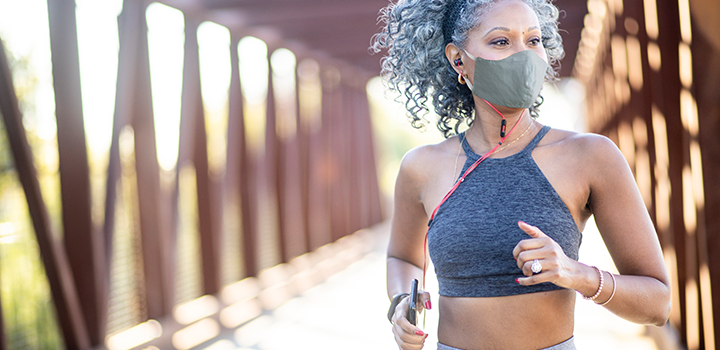
If you are 65 and over, you should still exercise if you feel well, says Mari Leach, Vitality biokineticist
The pandemic is a hurdle that those over 65 can leap over if you stay fit and healthy.
“I get asked, quite often, if older adults should exercise during the pandemic, and the answer is that you should definitely be as active as possible no matter what stage of life and as long as you are in good health,” says Leach.
“Not moving enough can cause health issues in everyone. But for older people, being inactive causes loss of quality of life and becoming dependent on others much quicker,” she adds.
The pandemic and exercise
While the way our bodies react to COVID-19 can depend on genetics, age and physical fitness, physical exercise can boost the immune system. “This means, low to moderate exercise for about 30 minutes, five times a week. Walking, gardening and doing housework can count as light to moderate exercise as well,” she says.
“Each session of exercise, particularly whole-body, dynamic cardiorespiratory exercise, mobilises billions of immune cells, especially those which recognise and destroy virus-infected cells,” says Leach.
“Exercise also releases various proteins that can help maintain immunity, so a little bit of regular exercise (taking all your existing conditions and abilities into account) is especially beneficial for older adults who we know are particularly vulnerable population during this COVID-19 outbreak,” she adds.
A week of exercise
Visit the 65+ fitness channel or try this weekly fitness routine:
- Monday: Spend 30 minutes repacking and organising your grocery cupboard for the week.
- Tuesday: Spend 20 minutes dusting, sweeping and vacuuming, then do 10 minutes stretching.
- Wednesday: 20 minutes of active gardening (digging and planting) that gets your heartrate up. Add 10 minutes of balance exercises.
- Thursday: Walk for 30 minutes with a pet, friend or family member, avoiding uneven roads and wearing a mask if you are walking outdoors.
- Friday: Dance to your favourite music for 20 minutes, followed by a 10 minute stretch or strengthening exercises.
- Saturday: Walk for 30 minutes with a pet, friend or family member, avoiding uneven roads and wearing a mask if you are walking outdoors.
- Sunday: Try an online yoga or tai chi class for your age group.
Reference:
ACSM: https://www.acsm.org/blog-detail/acsm-blog/2020/03/30/exercise-immunity-covid-19-pandemic

Monitoring your oxygen levels at home with a pulse oximeter
Evidence shows that some cases of COVID-19 pneumonia may initially cause a reduction of oxygen levels in the blood.
Using a pulse oximeter device at home helps detect oxygen-related problems early on and allows for early referral – before you become critically ill. You can get an oximeter with your HealthyCare benefit from Dis-Chem.